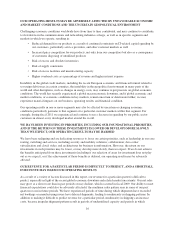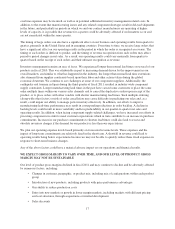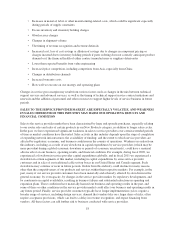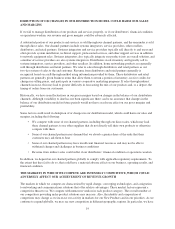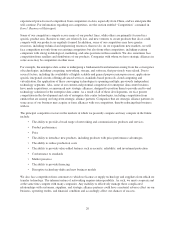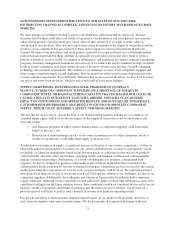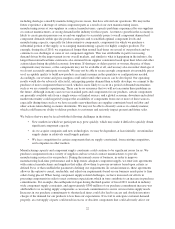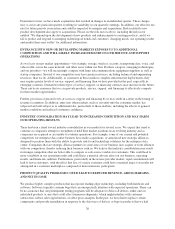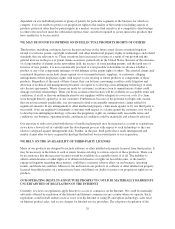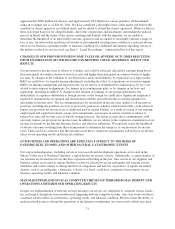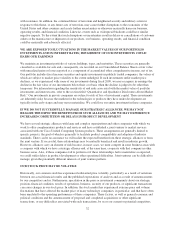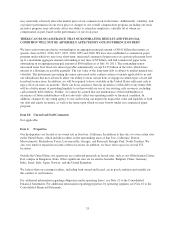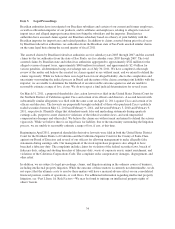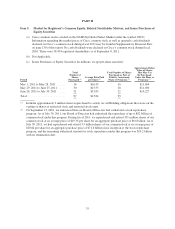Cisco 2011 Annual Report Download - page 33
Download and view the complete annual report
Please find page 33 of the 2011 Cisco annual report below. You can navigate through the pages in the report by either clicking on the pages listed below, or by using the keyword search tool below to find specific information within the annual report.WE HAVE MADE AND EXPECT TO CONTINUE TO MAKE ACQUISITIONS THAT COULD
DISRUPT OUR OPERATIONS AND HARM OUR OPERATING RESULTS
Our growth depends upon market growth, our ability to enhance our existing products, and our ability to
introduce new products on a timely basis. We intend to continue to address the need to develop new products and
enhance existing products through acquisitions of other companies, product lines, technologies, and personnel.
Acquisitions involve numerous risks, including the following:
• Difficulties in integrating the operations, systems, technologies, products, and personnel of the
acquired companies, particularly companies with large and widespread operations and/or complex
products, such as Scientific-Atlanta, WebEx and Tandberg
• Diversion of management’s attention from normal daily operations of the business and the challenges
of managing larger and more widespread operations resulting from acquisitions
• Potential difficulties in completing projects associated with in-process research and development
intangibles
• Difficulties in entering markets in which we have no or limited direct prior experience and where
competitors in such markets have stronger market positions
• Initial dependence on unfamiliar supply chains or relatively small supply partners
• Insufficient revenue to offset increased expenses associated with acquisitions
• The potential loss of key employees, customers, distributors, vendors and other business partners of the
companies we acquire following and continuing after announcement of acquisition plans
Acquisitions may also cause us to:
• Issue common stock that would dilute our current shareholders’ percentage ownership
• Use a substantial portion of our cash resources, or incur debt, as we did in fiscal 2006 when we issued
and sold $6.5 billion in senior unsecured notes to fund our acquisition of Scientific-Atlanta
• Significantly increase our interest expense, leverage and debt service requirements if we incur
additional debt to pay for an acquisition
• Assume liabilities
• Record goodwill and nonamortizable intangible assets that are subject to impairment testing on a
regular basis and potential periodic impairment charges
• Incur amortization expenses related to certain intangible assets
• Incur tax expenses related to the effect of acquisitions on our intercompany research and development
(R&D) cost sharing arrangement and legal structure
• Incur large and immediate write-offs and restructuring and other related expenses
• Become subject to intellectual property or other litigation
Mergers and acquisitions of high-technology companies are inherently risky and subject to many factors outside
of our control, and no assurance can be given that our previous or future acquisitions will be successful and will
not materially adversely affect our business, operating results, or financial condition. Failure to manage and
successfully integrate acquisitions could materially harm our business and operating results. Prior acquisitions
have resulted in a wide range of outcomes, from successful introduction of new products and technologies to a
failure to do so. Even when an acquired company has already developed and marketed products, there can be no
assurance that product enhancements will be made in a timely fashion or that pre-acquisition due diligence will
have identified all possible issues that might arise with respect to such products.
25



